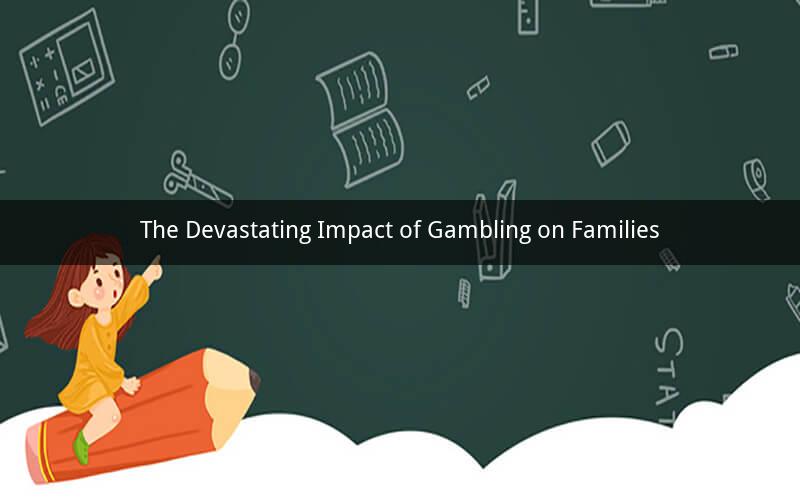
Gambling, a form of entertainment, has been around for centuries. However, its negative effects on families cannot be ignored. This article explores the various ways gambling can destroy families and the long-term consequences it has on its members.
1. Financial Ruin
One of the most significant impacts of gambling on families is financial ruin. When individuals become addicted to gambling, they often turn to family members for financial support. This can lead to financial strain and even bankruptcy. In some cases, family members may be forced to sell their homes or liquidate their assets to support the gambler. The resulting financial stress can create tension and conflict within the family, damaging relationships and trust.
2. Emotional Turmoil
Gambling addiction can cause emotional turmoil within a family. The addicted individual may become irritable, moody, and distant. They may also experience mood swings and depression due to the loss of money and the stress of hiding their addiction. Family members may feel guilty, embarrassed, and betrayed, leading to emotional distress. This can result in a breakdown of communication and a loss of intimacy between family members.
3. Mental Health Issues
Gambling addiction can have severe consequences on the mental health of family members. The stress and anxiety caused by the addicted individual's behavior can lead to depression, anxiety disorders, and other mental health issues. Children, in particular, may develop trauma-related conditions, such as post-traumatic stress disorder (PTSD), due to the constant exposure to their parent's addiction.
4. Family Disintegration
Gambling addiction can lead to the disintegration of a family. The addicted individual may become estranged from their family members, as they prioritize their gambling habit over their relationships. In some cases, the addicted individual may even abandon their family in search of more money to support their gambling addiction. This can result in a loss of family unity and support, making it difficult for family members to cope with the addiction.
5. Legal and Criminal Consequences
Gambling addiction can lead to legal and criminal consequences for both the addicted individual and their family members. The addicted individual may engage in illegal activities to support their gambling habit, such as theft, fraud, or embezzlement. This can lead to jail time and further strain on the family unit. Family members may also face legal issues, such as being named as a co-conspirator or witness in a criminal case.
FAQs:
Q1: How can I tell if my loved one has a gambling addiction?
A1: Look for signs of financial stress, mood swings, increased secrecy, and the inability to control their gambling behavior. If you suspect your loved one has a gambling addiction, encourage them to seek help from a professional.
Q2: Can a family recover from gambling addiction?
A2: Yes, recovery is possible. With the right support and treatment, families can heal from the trauma of gambling addiction. Therapy, support groups, and counseling can help family members cope with their emotions and rebuild their lives.
Q3: What can I do to support my loved one who is struggling with a gambling addiction?
A3: Encourage your loved one to seek professional help, such as counseling or a support group. Offer your support and understanding, but also set boundaries to protect yourself from financial and emotional harm.
Q4: How can I help my child cope with their parent's gambling addiction?
A4: Teach your child about addiction and its effects. Encourage them to express their feelings and seek support from family, friends, or a therapist. Remind them that their parent's addiction is not their fault and that they are not alone.
Q5: Is it possible for a gambling addict to overcome their addiction on their own?
A5: While some individuals may be able to overcome their addiction with self-help methods, professional help is often necessary. Therapy, support groups, and counseling can provide the necessary tools and support for a successful recovery. It's important to seek professional help to address the underlying issues that contribute to the addiction.